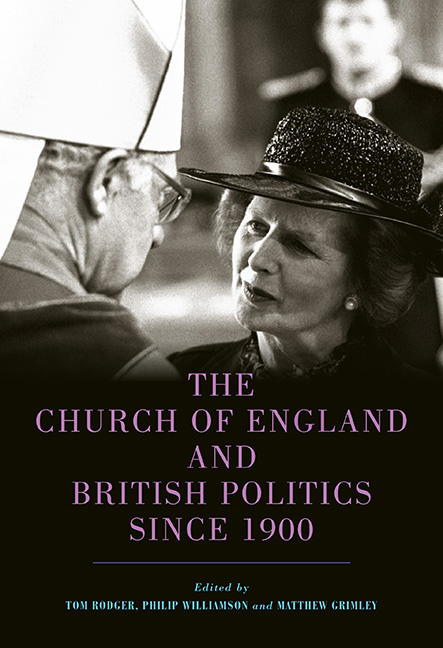Book contents
- Frontmatter
- Contents
- Notes on contributors
- Preface
- Abbreviations and locations of principal collections
- Introduction: the Church of England, the British state and British politics during the twentieth century
- 1 The politics of Church defence: Archbishop Davidson, the national church and the ‘national interest’, c. 1900–14
- 2 Archbishops and the monarchy: leadership in British religion, 1900–2012
- 3 Ecclesiastical conservatism: Hensley Henson and Lord Hugh Cecil on Church, state and nation, c. 1900–40
- 4 Hensley Henson, the prayer book controversy and the conservative case for disestablishment
- 5 Assembling an Anglican view of self-governing sexual citizenship, 1918–45
- 6 Politics in the parish: Joseph Needham at Thaxted, c. 1925–85
- 7 Anglicans, reconstruction and democracy: the Cripps circle, 1939–52
- 8 Parliament and the law of the Church of England, 1943–74
- 9 The Church of England and religious education during the twentieth century 199
- 10 Spiritual authority in a ‘secular age’: the Lords Spiritual, c. 1950–80
- 11 ‘A sort of official duty to reconcile’: Archbishop Fisher, the Church of England and the politics of British decolonization in East and Central Africa
- 12 A ‘baffling task’: Archbishop Fisher and the Suez Crisis
- 13 John Collins, Martin Luther King, Jr, and transnational networks of protest and resistance in the Church of England during the 1960s
- 14 The Church of England, minority religions and the making of communal pluralism
- Index
- STUDIES IN MODERN BRITISH RELIGIOUS HISTORY
6 - Politics in the parish: Joseph Needham at Thaxted, c. 1925–85
Published online by Cambridge University Press: 28 April 2020
- Frontmatter
- Contents
- Notes on contributors
- Preface
- Abbreviations and locations of principal collections
- Introduction: the Church of England, the British state and British politics during the twentieth century
- 1 The politics of Church defence: Archbishop Davidson, the national church and the ‘national interest’, c. 1900–14
- 2 Archbishops and the monarchy: leadership in British religion, 1900–2012
- 3 Ecclesiastical conservatism: Hensley Henson and Lord Hugh Cecil on Church, state and nation, c. 1900–40
- 4 Hensley Henson, the prayer book controversy and the conservative case for disestablishment
- 5 Assembling an Anglican view of self-governing sexual citizenship, 1918–45
- 6 Politics in the parish: Joseph Needham at Thaxted, c. 1925–85
- 7 Anglicans, reconstruction and democracy: the Cripps circle, 1939–52
- 8 Parliament and the law of the Church of England, 1943–74
- 9 The Church of England and religious education during the twentieth century 199
- 10 Spiritual authority in a ‘secular age’: the Lords Spiritual, c. 1950–80
- 11 ‘A sort of official duty to reconcile’: Archbishop Fisher, the Church of England and the politics of British decolonization in East and Central Africa
- 12 A ‘baffling task’: Archbishop Fisher and the Suez Crisis
- 13 John Collins, Martin Luther King, Jr, and transnational networks of protest and resistance in the Church of England during the 1960s
- 14 The Church of England, minority religions and the making of communal pluralism
- Index
- STUDIES IN MODERN BRITISH RELIGIOUS HISTORY
Summary
Discussions of the modern Church of England and politics all too easily focus exclusively on national leaders and central institutions. Yet it would be inconceivable to historians of earlier periods to neglect the (literally) parochial dimensions of Anglican politics, or its contribution to local electoral cultures – even after the extraction of governmental functions from the vestry, so often previously a cockpit of bitter conflict, removed a key site of political engagement.Investigation of religious outlets for political expression and vice-versa must take due account of the lived experience of rank-and-file Anglicans in the parish. Moreover, the Church's institutional structure ensured that local experience was not so removed from its national activity as it may seem; for example, a bishop in the House of Lords could hardly ignore a notably political parish priest in his diocese.
This essay explores one (lay)man's expression of his politics in a rural parish setting. There is no such thing as a typical parish. The diversity of theological and liturgical traditions within modern Anglicanism, and of the social and cultural situations of more than 12,000 parishes, ensures that none of the conventional stereotypes are reliably of general application. Indeed, this essay examines a rather remarkable combination of man and parish, not in order to advance claims of representativeness, but because this is such an unusual instance that it tests the limits of the parish as a setting for political activism. The case in question is also remarkable in that the engagement endured and matured through a long stretch of the twentieth century. Thus we consider the parochial politics of Joseph Needham (1900–1995) at Thaxted, Essex.
If the locality is absent from existing accounts of modern Anglican politics, so largely is the rural community, for researchers understandably prefer apparently more promising studies of inner cities such as Liverpool or Manchester, where sectarian or class divisions were especially pronounced and articulated through religious institutions. Yet one manifestation of Anglicanism in the twentieth-century English ‘imaginary’ was the country church, as a marker of a historically rooted national identity. It was easily presented as immune from the vicissitudes of quotidian political debate, even when this representation was deployed for Conservative political purposes.
- Type
- Chapter
- Information
- The Church of England and British Politics since 1900 , pp. 140 - 160Publisher: Boydell & BrewerPrint publication year: 2020

